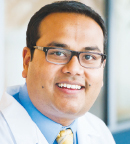
Aditya Bardia, MD
ADITYA BARDIA, MD, Director of Precision Medicine at the Center for Breast Cancer, Massachusetts General Hospital, Harvard Medical School, Boston, said: “This large, well-powered trial that included 181 centers and more than 2,600 patients unfortunately failed to show that celecoxib improved outcomes in early breast cancer. Three points should be noted. First, while the trial was negative, the median duration of follow-up was only 5 years, and longer follow-up is needed for the estrogen receptor–positive patients, who tend to have late recurrences. Second, almost 20% of patients did not take their assigned treatment for the full 5-year period in the clinical trial, and this would be a bigger problem in the real-world setting, as compliance is a big issue with long-term therapy. Finally, molecular genotyping from this trial (and other ongoing adjuvant trials such as ABC/Aspirin for Breast Cancer trial) would be very helpful in identifying predictive biomarkers that can identify subgroups that might benefit. For example, there is some evidence to suggest that regular use of aspirin is associated with better survival among patients with PIK3CA-mutant colorectal cancer, but not among patients with wild-type PIK3CA cancer.” ■
DISCLOSURE: Dr. Bardia reported no conflicts of interest.

